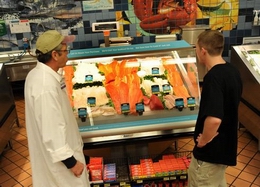 Sweetbay officials are taking a much harder line on the kinds of seafood they'll sell and making a big bet that customers will gravitate toward seafood certified as sustainable.
Sweetbay officials are taking a much harder line on the kinds of seafood they'll sell and making a big bet that customers will gravitate toward seafood certified as sustainable.The grocery company is preparing to announce a major new partnership with The Florida Aquarium in Tampa and other groups on stringent standards for seafood and pledging that every seafood product sold in its stores comes from sustainable sources.
That policy covers 2,500-plus seafood items such as salmon flown in from the Northwest, bags of shrimp flown in from Asia, cans of tuna, frozen fish sticks and even soups with seafood as the main ingredient.
What's more, customers should be able to determine online where a seafood item originated.
The public announcement of the policy is set for next week, with a follow-up ceremony at the aquarium a week after that. "This is part of our corporate social responsibility as a company," said Sweetbay spokeswoman Nicole LeBeau. "It's important to us, and for customers, to know the seafood they buy and use is from sustainable sources and will be there for years to come."
Sweetbay joins a growing list of grocers paying more attention to sustainability. Publix two years ago began a drive to grade seafood suppliers on sustainability. Target, Walmart, Costco and Whole Foods all have varying sustainability projects and standards, and McDonald's now promotes its fish as sustainable, including ads on TV showing fishermen in Alaska harvesting pollock for McDonald's sandwiches.
For the aquarium, this is an offshoot of work it does to promote sustainability. Besides conservation research, staff at the aquarium talk about sustainability to guests looking in on tanks, and they hand out pocket guides that list the sustainability and risk status of individual seafood species.
For customers in a Sweetbay store, the first visible sign will be posters and floor placards at the seafood counter promoting a website — www.sweetbaysupermarket.com/seafood — that they can use to determine where every seafood item at the store originated.
Prices should not change dramatically, LeBeau said, partly because Sweetbay started phasing out some products from stores last year, so current inventory and prices already reflect the change.
Behind the scenes, the policy means working with the Gulf of Maine Research Institute on species status, and ensuring that suppliers provide Sweetbay "full traceability" to their fishery area or seafood farm. A contract with Florida's Gulf Coast Fisheries group provides other data to the aquarium and Sweetbay.
Any wild-caught seafood must come from "source fisheries that are governed by credible, enforceable and science-based management plans." For farm-raised seafood, Sweetbay will "require certification to the Global Aquaculture Alliances Best Aquaculture Practices."
In Tampa, Sweetbay is partnering with the aquarium for expertise in researching seafood, partly because the store's main focus is on the day-to-day work of stocking groceries and supplies, not marine science.
"Sustainable seafood is a critical piece to the ecological safety of our oceans as well as the wellbeing of our local fisherman," said Thom Stork, president and CEO of The Florida Aquarium. "Sweetbay's dedication to sustainable seafood is revolutionary and will be instrumental in educating people on the importance of this issue while helping to ensure the long-term sustainability of our local waters."
Besides the aquarium, Sweetbay's sister companies, Food Lion and Hannaford, are rolling out sustainability rules.
What the policy does not do is institute a blanket ban of an entire species of seafood such as sea bass or grouper because, in the company's words, there are many ways to raise seafood in different regions. So they take an individual look at each supplier and test whether it can comply with criteria.
Still, if Sweetbay can't find a sustainable supplier for a specific product, they pledge not to sell it. That's already meant some products have disappeared from the shelf, including specialty items such as certain types of fresh octopus, because marine researchers could not identify a provider that was certifiably sustainable.





